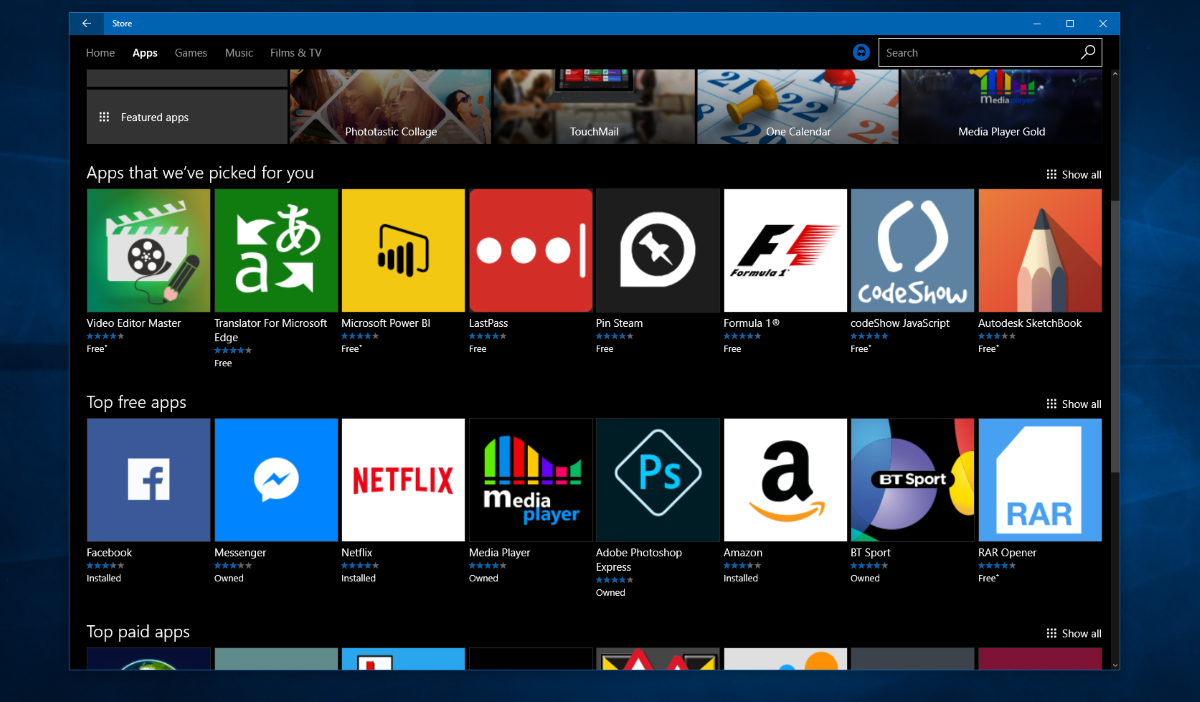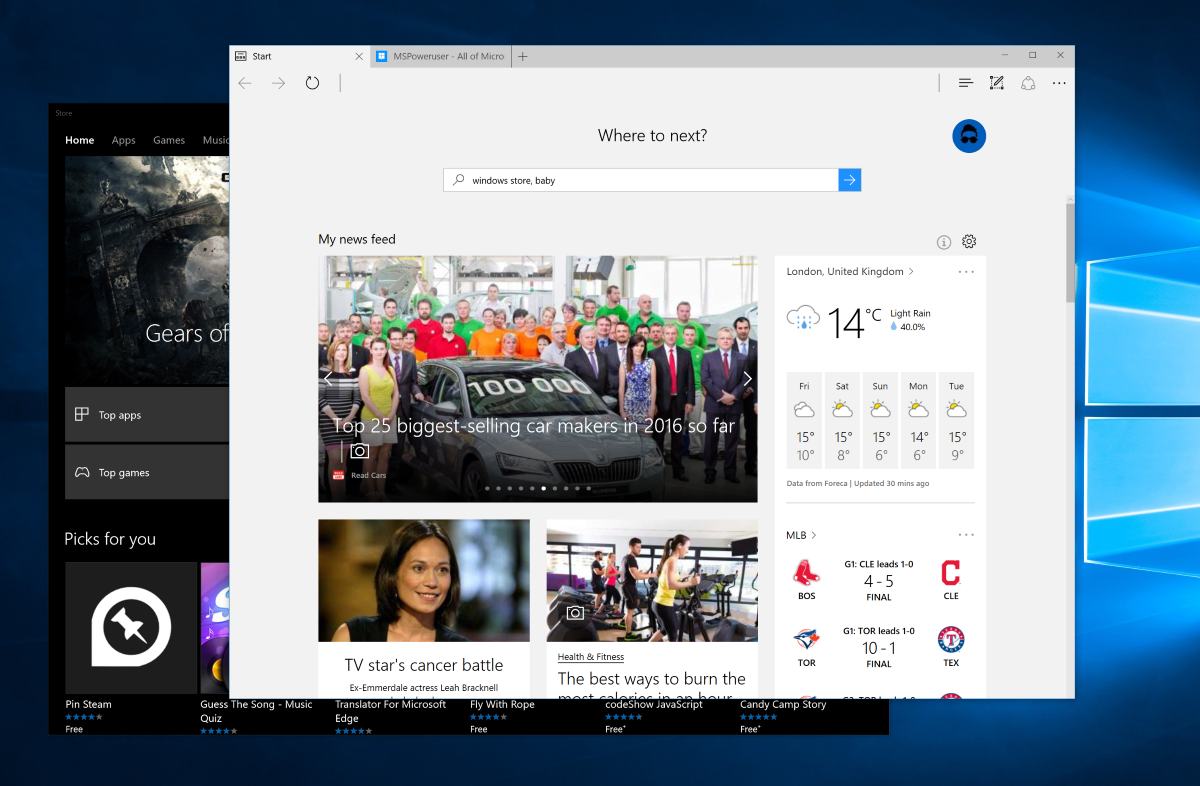Using the Windows Store's Universal Apps exclusively for a week was an exercise in frustration
6 min. read
Published on

I took on an experiment where I would use Microsoft universal Windows Store apps for a week rather than using desktop apps to try and pre-empt what life would be on a Windows 10 Cloud powered PC.
With the exception of Slack, I attempted to use Microsoft’s Universal apps like Edge in lieu of Google’s Chrome, OneNote in replacement of OneNote 2016 and the Office Mobile suite instead of the Office 2016 app. I also downloaded and installed the OneDrive app and switched back to Groove Music on my PC instead of using iTunes for Apple’s Music service like I was used to.
Overall I had a mixed experience, I was able to get away with using just Store apps for a day or two, before the cracks began to show.
Like most desktop users, much of my computer usage involves using the internet. In essence, a powerful browser with extension support for things like Adblock Plus (for a few sites with out of control ads), Grammarly for helping with writing, and while a bunch of other extensions I’m currently trying out to streamline my online workflow.
When it comes to extensions, Edge only has a few. There’s support for the Adblock Plus which has whitelist support and send to OneNote and EverNote for quickly taking notes and clipping pages, as well as Amazon Assistant for streamlining online shopping. When you step out of that limited circle though just like the Windows Store, there’s barely anything else. There aren’t any Google extensions (shocker), nor are there any that change your new tab page to maximize productivity. Pocket on Chrome integrates with the New Tab page to show me stories that I’m generally interested in saving and reading later on Pocket’s iPhone app, and there are extensions to quickly show you the weather as well.
Most painfully, however, Edge has issues with performance for me. I won’t attempt to generalize my experience to every single person who uses Edge, but my experience with using Edge for any sustained period of time leads to frustration, lost work, and freezing. This is consistent whether I use my PC on Insider builds, freshly reset or otherwise.
I wish I could say I stuck with Edge for the full week, but I ended up bailing on the browser – s tool that gets in the way isn’t very useful.
OneNote is a generally excellent app from the store and one of the few standout universal Windows apps in my opinion. Most of the time, it worked just as you would expect, allowing text input and file attachment. However, I often had to open the full OneNote 2016 app because OneNote would inexplicably freeze while syncing, preventing you from working until it continues syncing. If I was in spotty internet area, I may as well have kissed my productivity goodbye because the app would just sit there trying to sync for minutes.
As for the rest of the Office Mobile suite, they are fairly useless on the desktop due to lack of any form of multi-instance support as well as their penchant for freezing when large files or documents are opened. I won’t go into details because Microsoft has now marked them as “Mobile Only” in their store page using large fonts to pre-empt complaints from PC users who download them, but you probably shouldn’t consider using these apps for extended work on your PC.
Groove Music is a decent music app and looks rather nice —especially after its recent interface updates. I have nothing bad to say about it. It actually works better than both iTunes and Spotify for me personally, and all I do is stream music using Groove Pass and listen to playlists. It doesn’t do anything advanced, but what it does do, it does competently.
The bottom line here is that probably you can use universal Windows apps solely on your PC if you have the stomach for it. However, this isn’t desirable – and the reason for this remains the same as in Windows 8 and Windows RT.
Windows Store apps just don’t offer the capability that can be found via traditional Windows apps – and if they can no one’s exploited it as of yet. There are many useful apps for sure, but those apps are mostly apps which make sense on a mobile phone and tablet and less so on a desktop or laptop – like the many to-do list apps you can find in the store.
Microsoft’s own in-box apps like Calendar and Mail are useful for basic users, but they pale in comparison to desktop apps for the same tasks and aren’t as useful as their equivalent web-apps.
Groove Music is a capable and competent music service, but iTunes and Spotify are more powerful and have the advantage of being better on mobile platforms people actually use. OneNote is relatively full featured, but a few head scratchers here and there and the lack of theming support make OneNote 2016 more desirable. While Skype is already the worst chat app known to man, it somehow manages to perform even more poorly as a universal app.
What makes this disappointing is that Microsoft had the same problems in 2012. Windows 8, the Surface RT and original Surface Pro were panned both for a lack of viable Windows store apps and the relative uselessness and toylike nature of the included apps. Microsoft may have dressed these apps up in fancier, more appropriate clothes, but they still remain toylike in comparison.
Universal apps aren’t a bad idea, and Microsoft is still working on them, trying to make them better, they just aren’t there yet. For consumers, this isn’t a problem. They simply do not care, and they don’t have to. Universal apps don’t bring any tangible benefits, they are simply re-wrapping tools we already have in packages that few seem to want. With the demise of Windows phone where UWP made the most sense, one might even consider this as a form of shuffling the decks on the titanic. For Microsoft and the few dedicated Windows store developers, perhaps it’s time to consider that it isn’t that time is running out for UWP, but that it already died along with Windows phones.










User forum
0 messages